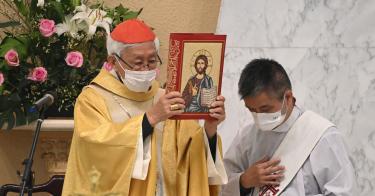These are dark times for religious freedom in China—and when Pope Francis tells Reuters that he looks forward to renewing a controversial Sino–Vatican agreement, they get darker still.
At home, the Chinese Communist Party is openly pursuing the largest-scale genocide in the world. Abroad, it has tacitly sanctioned Vladimir Putin’s brutal invasion of Ukraine, which has seen Russia kidnap and forcibly relocate over a million men, women, and children and given rise to numerous other atrocities.
How can the global leader of the Catholic Church even contemplate doing business with such a murderous regime?
Originally signed in September 2018, the deal between the papacy and Beijing was billed as an effort to protect the Chinese faithful, who are split between an underground church loyal to the Vatican and the state-sanctioned Catholic Patriotic Association (CPA). The agreement reinstated seven CCP-appointed Roman Catholic bishops who had been ousted by the Vatican as illegitimate representatives of the Church. It provided that, henceforth, the Vatican would have final say on appointments, but could select only from among candidates approved by Beijing.
>>> Cardinal Zen and Rising Religious Persecution in China
The papacy renewed the agreement in 2020, and it is up for another two-year renewal in October.
Vatican City can’t make the case that Chinese Catholics who refused to join the “official” CPA are any better off or have any greater religious freedom as a result of this agreement. They aren’t, and they don’t. It remains illegal for anyone under 18 to attend church in China. The Catholic News Agency notes that the Chinese Communist Party continues to put pressure on bishops and priests who are not aligned with the regime. For example, Cardinal Joseph Zen, currently out on bail, will go to trial in Hong Kong next month on charges of “conspiracy to collude with foreign forces.” Open Doors reports that “surveillance in China is among the most oppressive and sophisticated in the world. Church attendance is rigorously monitored, and many churches are being closed down.”
How, then, can the papacy justify the agreement’s renewal?
Within the Vatican, the main proponent of this deal is Cardinal Secretary of State Pietro Parolin. Parolin’s soft-on-Beijing strategy is supported by powerful progressive-Catholic groups from the Society of Jesus to the Community of Sant’Egidio. Pope Francis himself appears content to go along with this faction’s wishes . . . and see no evil. Despite having diplomatic relations with Taipei, the Vatican has remained silent about the alarming Chinese military exercises near Taiwan. The Holy See, it seems, does not want to annoy Beijing if it means putting the agreement’s future at risk.
Abandoning the battle for religious liberty in the face of Communist China’s relentless anti-religion campaign has not come without a cost for the pope. Maintaining the Sino–Vatican deal undermines the moral authority of the church, and many of the devout are not happy about it.
Making matters worse, the agreement is also a geopolitical threat: It could push Catholic-majority Latin American countries, which currently have diplomatic relations with Taiwan, to formally recognize the People’s Republic of China. For instance, last December, Nicaragua broke off relations with Taipei, leading Beijing to open an embassy in the country.
>>> The Xinjiang Police Files Should Prompt Action Against Uyghur Genocide
Finally, the agreement puts the Vatican’s diplomatic clout at risk of irrelevance. China is using all of its diplomatic and economic tools to increase its political influence in the countries with which it makes agreements. Beijing wins when it widens the divide between the Holy See and the West. The day is coming, for instance, when the Chinese Communist Party will push the Vatican to break off relations with Taiwan just as Nicaragua did.
If the free world is serious about fighting back against China’s malicious actions, it can’t wait around for this pope to retire. It needs to take the issue of religious freedom much more seriously now—and that must start with Washington.
President Biden should lead the effort to help the Holy See recognize the serious threats emanating from its deal with Beijing, persuading the pope not to renew the agreement. Beijing’s systematic violation of religious freedom cannot be tolerated any more than its many other crimes. This is not only a geopolitical issue. It is a moral imperative.
This piece originally appeared in The National Review




